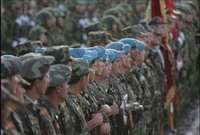Germany tries to improve anti-terrorism cooperation with US
Wolfgang Schaeuble is seeking the way to improve anti-terrorism cooperation with the United States.

The two officials said that they were focusing on improving data exchange to prevent terrorist operatives from traveling undetected over borders.
The issue is sensitive in Germany and other countries in Europe, which have strict data protection and privacy laws.
In a speech at the German Marshall Center, a nonpartisan policy institution, Schaeuble said Monday that intelligence was the most important tool in fighting terrorism. To counter global terrorism threats, Western countries need to find new ways to balance security and privacy concerns.
"I believe that data protection should not make the state blind and ignorant," he said. "Data protection does not require the state to look away when serious crimes are being prepared," he said.
Schaeuble's meetings in Washington come just weeks after Germany arrested three men accused of planning massive terrorist attacks against U.S. targets in Germany. German officials have credited intelligence provided by the United States with helping to foil the plans.
German and U.S. officials have said that some of the information passed to the Germans included electronic intercepts from Pakistan.
"The success that we have had in the last few weeks is a result of very close and trustful cooperation," Schaeuble said earlier at a press conference with Chertoff.
Early this month, German police raided a rented cottage in central Germany and arrested two German converts to Islam and a Turkish man. All three had trained in terrorist camps in Pakistan, German prosecutors say.
The case has raised concerns in Germany about homegrown extremists linking up with foreign terror groups. Chertoff and Schaeuble said they are looking for ways to better monitor suspects and share information their authorities learn.
"For networked terrorists to operate, they have to cross borders and our ability to prevent attacks before they happen, requires us to be as nimble as they are" Chertoff said. He said that he and Schaeuble were continuing discussions about how to share information while respecting privacy concerns.
"Usually we are talking about a very small amount of information: biographic information, name, date of birth or fingerprints. This is really meant to identify people," he said.
Schaeuble said that German authorities were still investigating ties the three arrested suspects might have to other countries including possibly some other European countries. He said that the investigation was difficult because the men operated very carefully and professionally in covering up their links to a broader network.
In his speech, Schaeuble also weighed in on a controversy over whether or not Iran's President Mahmoud Ahmadinejad should be allowed to speak at Columbia University during a visit to New York for the United Nations General Assembly.
Columbia has been criticized for providing a platform to a figure, who has been accused of questioning the Holocaust.
Schaeuble said that despite laws in Germany that make denying the Holocaust illegal, if he were responsible for deciding in a similar circumstance whether Ahmadinejad could make such a speech in Germany, he would allow him.
"I wouldn't forbid it, but I wouldn't attend," he said. He added that he would tell the Iranian leader that "a man who is denying the Holocaust as a head of state, he cannot expect to be respected by any civilized person."
Schaeuble planned to meet with U.S. lawmakers and the National Security Agency's director, Lt. Gen. Keith Alexander on Tuesday.
Subscribe to Pravda.Ru Telegram channel, Facebook, RSS!


